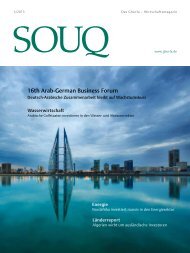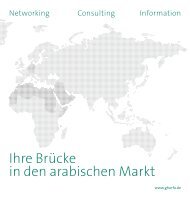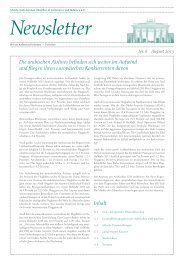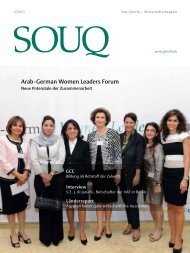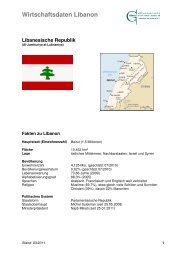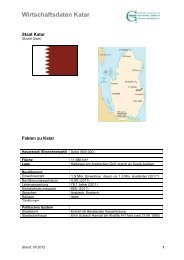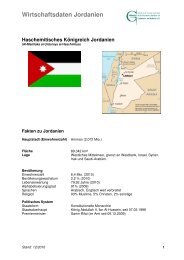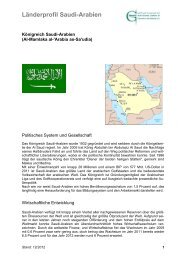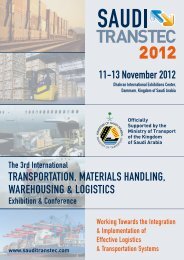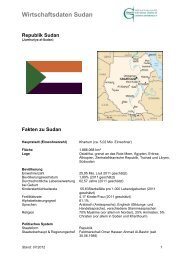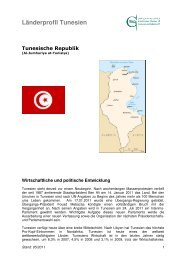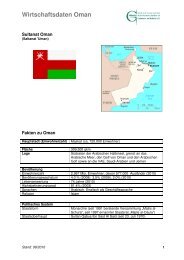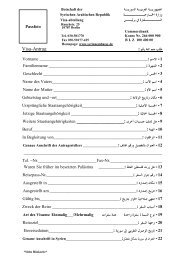The Arab-German Trade Directory - Ghorfa
The Arab-German Trade Directory - Ghorfa
The Arab-German Trade Directory - Ghorfa
Create successful ePaper yourself
Turn your PDF publications into a flip-book with our unique Google optimized e-Paper software.
Hisham Zazo, the country's first assistant<br />
tourism minister, said that the sector<br />
comprises 11.3% of Egypt's GDP and<br />
19.3% of the total investment made in<br />
foreign currencies. Zazo said, "Egypt plans<br />
to attract 14 million holidaymakers and<br />
boost hotel capacity to 240,000 rooms by<br />
2011." Leisure tourism is the largest<br />
segment, with business and conference<br />
tourism coming in second. Hotel capacity has<br />
been increasing by 5% per year. More<br />
development is on the horizon and the<br />
ministry of tourism is working to make<br />
licensing and land purchasing easier, focusing<br />
on the northern coast for both residential and<br />
foreign tourists.<br />
Construction & Real Estate<br />
<strong>The</strong> last two years have been good ones for<br />
the construction and real estate sector with<br />
increased activities ongoing in the sector.<br />
Accounting for some 7.1% of GDP in<br />
2008/2009, high-profile real estate projects<br />
and improvements in the country's tourism<br />
sector drove the industry. <strong>The</strong> need for lowcost<br />
housing and infrastructure development<br />
should help to push the industry onwards.<br />
Rapid population growth has created the<br />
need for 22 new cities in 2008/09, all of<br />
which will need a considerable amount of<br />
real estate. <strong>The</strong> introduction of mortgage<br />
facilities will give a boost to the real estate<br />
sector and as businesses and investors start to<br />
look beyond Cairo the real estate boom looks<br />
set to spread outward beyond the capital.<br />
IT & Telecoms<br />
Along with other major infrastructural<br />
changes, telecommunications in Egypt have<br />
come a long way in the past 10 years. <strong>The</strong><br />
private sector is just starting to emerge,<br />
allowing for more competition in terms of both<br />
prices and services. Call charges for mobile<br />
phones have been dropping significantly for the<br />
last five years and the entrance of a third mobile<br />
operator, Etisalat Misr, is increasing competition<br />
even more. <strong>The</strong> issuance of 3G licenses is also<br />
causing waves in the industry and the country<br />
is bracing itself for a more open market. IT is<br />
also becoming a more important sector.Outsourced<br />
call centres are becoming major employers and<br />
a new emphasis is being placed on computer<br />
literacy both in schools and workplaces.<br />
Foreign <strong>Trade</strong><br />
Egypt has a large structural trade deficit,<br />
<strong>The</strong> Egypt section<br />
is sponsored by<br />
which reached $25.2bn in 2008/2009, up<br />
from $23.4bn in 2007/2008. Merchandise<br />
export decreased in 2008/2009 to $25.2bn<br />
from $29.4bn in 2007/2008. <strong>The</strong> import bill<br />
decreased by 4.7% to $50.3bn in 2008/2009<br />
from $52.8bn in 2007/2008. <strong>The</strong> invisibles<br />
surplus of $25.4bn was insufficient to offset<br />
the trade deficit, and the current account<br />
recorded a deficit of $4.4bn in 2008/2009.<br />
Forecast<br />
<strong>The</strong> Economic Intelligence Unit (EIU)<br />
shows that all categories of Egypt's<br />
business environment rankings are forecast<br />
to improve.<br />
<strong>The</strong> categories that are expected to<br />
improve the most are: foreign trade and<br />
exchange controls, as imports tariffs<br />
continue to be lowered; financing, as small<br />
and medium-sized firms gain greater<br />
access to the stock-market, banking<br />
regulation improves and banks step up their<br />
risk-assessment strategies; taxes, because of<br />
ongoing improvements to the tax administration;<br />
the macroeconomic environment, as robust<br />
economic growth is expected to continue;<br />
infrastructure, as the government invests<br />
heavily in road, rail and sea facilities; and<br />
government policy towards private enterprise<br />
and competition, as privatisation continues<br />
and competition legislation is improved.<br />
Market opportunities will also improve in<br />
the future as a result of greater economic<br />
diversification and better foreign investment<br />
policies. After slowing sharply in 2008/09<br />
and 2009/10, economic growth is projected to<br />
strengthen over the remainder of the forecast<br />
period, to an average of 6.7%, slightly below<br />
the growth rates recorded between 2005/06 and<br />
2007/08. <strong>The</strong> government's infrastructure<br />
programme and continued economic reform<br />
will increase growth potential in the longer<br />
term and productivity.<br />
Investment<br />
<strong>The</strong> prime drivers of the economy are<br />
foreign direct investment (FDI), remittances,<br />
Suez Canal fees and tourism.<br />
Changes in economic policy have been<br />
made to minimise the state's role. FDI<br />
inflows reflect extremely positively on<br />
global investment sentiment in Egypt. Data<br />
released by the Central Bank of Egypt<br />
reveals that Net FDI inflows increased from<br />
$509.4 million in FY 2000/01, to reach<br />
$11.1 billion in FY 2006/07 and $13.2<br />
billion in FY 2007/08, approaching $21bn in<br />
July 2007 to June 2009. According to the<br />
World Investment Report published in 2008<br />
by the United Nations Conference on <strong>Trade</strong><br />
and Development (UNCTAD), Egypt was<br />
ranked first in North Africa and second in<br />
the African continent in attracting foreign<br />
direct investments.<br />
Modernization has brought a great deal of<br />
investment, with the year 2006/07 seeing<br />
$7.48bn worth of funds flowing into the<br />
industry sector.<br />
Purchases of new cars are increasing,<br />
indicating greater wealth and confidence<br />
among consumers. Following global trends,<br />
economic zones and industrial parks are<br />
offering generous advantages to companies,<br />
boosting trade and attracting even more<br />
investment.<br />
A sudden reduction in import taxes and a<br />
growing middle class has also created a<br />
healthy environment for the retail sector<br />
and the Global Retail Development Index<br />
ranked Egypt at 14th place in terms of<br />
potential.Meanwhile,new shopping complexes<br />
and malls are appearing along with the<br />
introduction of international brand names.<br />
<strong>German</strong>y-Egypt <strong>Trade</strong><br />
Egypt is one of the principal trade partners<br />
for <strong>German</strong>y in the <strong>Arab</strong> world. Bilateral<br />
trade rose considerably in 2008, reaching<br />
€3.9 bn. <strong>German</strong> exports to Egypt came to<br />
€1.42bn in 2004, €1.7bn in 2005, €1.87bn<br />
in 2006, €2.07 in 2007 and mounted up to<br />
€2.68bn in 2008.<br />
<strong>The</strong>y contained primarily machinery,automotive<br />
equipment, electronics and pharmaceuticals.<br />
<strong>German</strong> imports from Egypt came to<br />
€1.17bn in 2008, rising up from €0.78bn in<br />
2007.<br />
Egypt principally exports fuels, textile products<br />
and steel products. From January to September<br />
2009, <strong>German</strong> exports to Egypt slightly<br />
decreased to €1.89bn (-2.8%) and <strong>German</strong><br />
imports from Egypt decreased to €0.68bn<br />
(-28.7%) as a result of the economic downturn.



